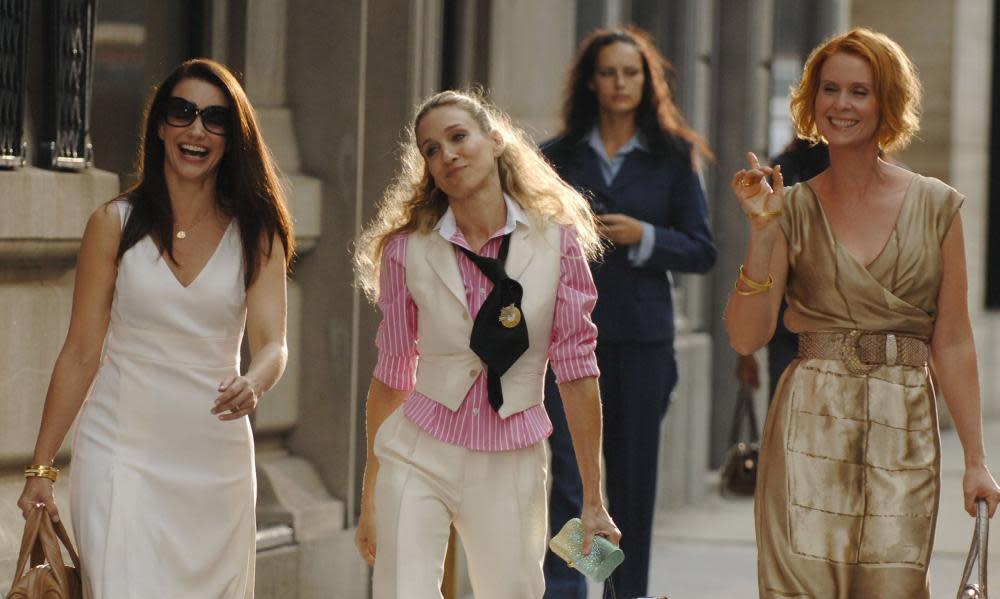From BLM to LGBT+: why Sex and the City will need a 2020 rethink

Sex and the City is back, with a new name – And Just Like That … – and a new cast, which is to say, the old cast, minus Samantha (Kim Cattrall). Anyone who is surprised to see them recovered from the bruising experience of the movie sequel just has too long a memory. Sex and the City 2 was more than 10 years ago. The statute of limitations on awful moments in culture has long since expired.
To revisit that film for a second, though, its flaw was neither the excruciating dialogue nor the amateurish, uncertain plot; rather, its gorging consumerism, the signature shoe-fetishism of the series applied to every known item that a woman could buy. It held up a mirror to 21st-century excess and nobody, but nobody, liked what they saw. One IMDb reviewer called it a “terrorist motivational tool”. (In this it had a lot in common with the third volume of Fifty Shades of Grey; I have thoughts on that segue, from genuine lust to a sad, consumer simulacrum, as a metaphor for late capitalism, but I’m saving those for my PhD.) In the series itself, the shopping element was more of a running joke, a self-deprecating nod to the fact that intelligent, empowered, evolved women can still do really stupid things, such as spending their lunch money on earrings. There is no reason for the film to have stained the televisual side of the franchise.
Yet how will a show created at the apex of the 90s play in the 2020s? One wag on Twitter pointed out that the age of the characters – 52 – is the same of that as Blanche in The Golden Girls, but I think we can feel relatively confident that they won’t have receded into the classic post-menopausal territory, someone-else’s-aunt (nor did they, in fairness, in The Golden Girls). One thing about SATC that you had to admit, even if you hated it, was that it always took a proposition that would normally turn a woman into an antiheroine – promiscuity, ambition – and reworked it as something to be celebrated.
Yet the world has changed in important ways, and the race politics of And Just Like That… will have to up its game if it is to seem as anything other than a period piece. Cynthia Nixon, who played Miranda, has said as much already in interviews. Sex and the City was considered too white even when it was made. I remember interviewing Cattrall in the early 00s, and saying that what I found odd about the show was that there didn’t seem to be much friendship between the genders. Immediately defensive, she countered: “I don’t have very many black girlfriends. Most of my friends are from very similar backgrounds. A lot of people have said, ‘Why don’t you have an Afro-American [friend]?’, but that’s not what this story is about.” It was a fantastically weird response to a charge I hadn’t made (this show is very white because I don’t have any black friends). But the rest of the cast, Nixon especially, were very receptive to the criticism, and later vocal allies of the Black Lives Matter movement. And Just Like That … is unlikely to have the same blind spot.
The sexual politics could also use some updating; again, with Nixon involved, it’s hardly going to blunder into this new decade with its heteronormative Blahniks studs-first. Nixon came out as gay in 2004, just as SATC ended, and has been a passionate advocate for transgender rights since her son transitioned. But there was something else in the sexuality mix, last time around, besides what it meant to be a woman, or even what a feminist looked like. The sex had a very 90s sensibility, ludic, carefree, intensely commodified, but that was fine because it was all ironic. I suppose that was the point I was trying to make to Cattrall about friendships between the genders (or its absence) – there never seemed to be any intimacy or human feeling, not because men were some unknowable continent, but rather because they were measured out by their body parts, the female characters giving their most careful consideration to why their sperm tasted funky.
You can trace a through-line from this to Lena Dunham, echoing the way the economy has changed over the same period: just as we went from the debt-fuelled, joyful, unserious bonanza of the 90s to the disempowered precariousness of the 2010s, so the portrayal of sex went from commodification-as-liberation in SATC to the experience of being commodified yourself in Girls. It’s hard to imagine a show that was so intensely part of its fin-de-siecle context making a believable transformation into such a different time. Yet I guess if the rest of us can manage … (this ellipsis is deliberate, by the way).
The underlying story is that production companies are in a scramble, in the US and the UK, to remake classic dramas. And Just Like That … is to be applauded for its cast-constancy, since I’ve heard of another remake idea that tried to cut out its female creator. The impulse is like a hot chocolate after a bitterly cold walk, a homecoming. Whether we love it or hate it, we can all see the point of comfort TV. The unsettling question is, when do we stop needing so much comfort?

 Yahoo Movies
Yahoo Movies 
